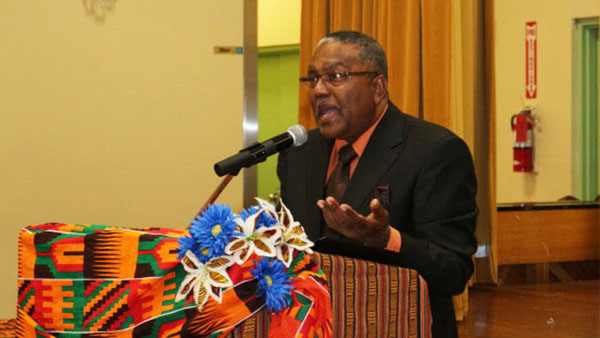By Michael Van Cooten
PRIDE Publisher/Editor
TORONTO, Ontario Monday, June 25, 2018 — “How are leaders developed, and who does the developing? That work starts in the homes and schools,” observed Retired Senior Judge for the Central East Region of the Ontario Court of Justice, Gregory Regis.
The St. Lucia-born, highly-acclaimed and respected former judge — who is a member of the Association of Ontario Judges, the Canadian Association of Provincial Court Judges and the Osgoode Society for Canadian Legal History — made his observation, during his keynote address, at the Africentric Alternative School’s Ninth Annual Gala Dinner and Awards, earlier this month, on Friday, June 15.
The school’s principal, Luther Brown, appointed in February, 2017, said the event is an annual fundraising gala, which has the objective of garnering the funds necessary to support school activities, such as trips to historical sites, and providing experiences that are helpful to the students’ development as leaders.
He added that it is also aimed at “connecting the school and the community, in an effort to build relationships and to present opportunities for the community, outside of the school, to be supportive”.
The principal also envisions that the event would serve to attract “the community to participate as volunteers in a variety of ways, including leading extra-curricular activities, serving as resource for the school in areas of mentoring, providing internship-type opportunities, and helping students to gain a broad experience that helps them become the leaders that our society and the world needs”.
The theme for the school’s fundraising awards dinner was “Developing Leaders” and, after expressing how “honoured” he was to be present; and congratulating the graduates and award recipients, the parents and family members, and teachers and school staff, “who have supported and nurtured the students, during their sojourn through this special school”, former Justice Regis launched, spiritedly, into his theme-related message.
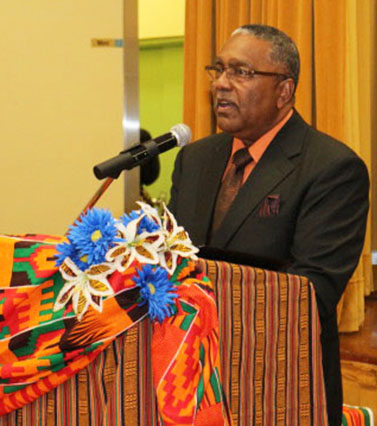
Before immigrating to Canada, Regis worked as a photo journalist for Saint Lucia’s national newspaper, “The Voice”; served as a news editor for Radio Saint Lucia; and was the correspondent in Saint Lucia for several Caribbean and international news outlets, including the Associated Press, the Trinidad Express, Radio Guardian and Radio Antilles. In Canada, he worked as an editor for the Canadian Broadcasting Corp. (CBC) before entering law school in his late 30’s. Photo by Kingsley Gilliam.
“This is not generally acknowledged in modern society, but I believe people who are engaged in educating our citizens, as well as those who work in the health care sector, are making the most significant contribution to society. I salute you tonight,” Regis told the 120-strong audience at the Jamaican Canadian Association (JCA) Centre, in North Toronto.
The recipient of the African Canadian Achievement Award (ACAA) for Excellence in Law added, that normally, when some people think about leaders, they tend to focus in areas, such as the church, politics and business, but, he pointed out “there are good leaders everywhere, especially in our homes and communities”.
“What do parents and other adults in the home do when a baby arrives? Everyone becomes involved in training that baby. They teach the child life skills such as sharing, waiting their turn, and being polite. All these adults are leaders.
“As the children get older, some, almost naturally, start playing leadership roles. And you can see it. Nicole seems to be able to get the other children to follow her. She sets the rules for the activities when the cousins are visiting.
“At school, Karim, without any prompting, starts organizing the other students, so they can speak to the principal, about issues affecting the students in the school.
“Nicole and Karim are leaders.”
Regis, who joined Ryerson University, on February1, 2017, as a distinguished visiting professor, elaborated, “In the workplace, when John takes on the role of organizing the office basketball team, John is being a leader. When Maria goes around the factory floor and collects money to help another worker buy a stroller, for the baby due next month, Maria is being a leader.
“Some people are natural leaders, while others come at leadership in a more deliberate way. It makes no difference how one arrives in a leadership role, I believe that a good and successful leader must possess a few important qualities.”
A leader must have integrity; people must be able to trust a leader; his or her words should be binding; and people must be able to rely on what they say, noted Regis, who holds a Bachelor of Laws degree from Osgoode Hall Law School at York University, and is a graduate of Ryerson’s School of Journalism.
“A leader must be a good listener. If one does not listen, one can never learn. An ignorant leader becomes a despot.
“A leader must be able to anticipate. He or she should be able to look ahead, and picture the future. A leader must be courageous. That means being willing to try new things. It means standing up for what is right, and working to bring others along with you,” he asserted.
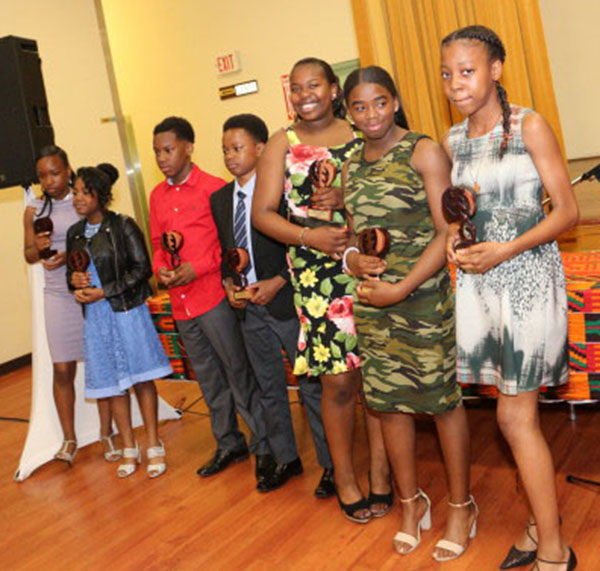
The Afrocentric Alternative School’s 2018 graduating class, from left to right: Malika Ruddock-Scott, Monisha Clarke, Terrell Joslyn-Victor, Frank Abankwah, Brianna Asiamah, Brianna Robinson and Omega Church. Photo by Kingsley Gilliam.
But, he posited, as he sees it, “the most important quality of a leader is authenticity”. And this, he advised, must be so, “in reality and perception. People should not have to wonder, whether you are genuine or not”.
“An authentic leader is always thoughtful, caring, tolerant, and compassionate; an authentic leader is not thin-skinned or afraid of criticism; an authentic leader is a person who has a sense of humour,” the 2014 BBPA Harry Jerome Lifetime Achievement Award recipient further argued.
“An authentic leader is always fair. Such a leader will not play favourites, but will treat everyone by the same standard. An authentic leader is confident, and at the same time humble.”
He said that those in the audience would be wrong in thinking that it is impossible for one person to have all these qualities, adding “We all have the ability to develop these qualities. There are ways to do that.”
Regis then targeted his inspirational and hopeful message, directly, to the graduates and the other young people present, telling them that “all these qualities are already within you”.
“Just take a look at what happens when you play with each other. Even without any talking about it, you decide who will be in charge. This happens when you are playing sports, or when you chat on the internet.
“You already have some of the tools to develop these leadership qualities. You now have the opportunity to acquire more,” he forcefully told them, and offered the following advice.
“As you enter high school, make a conscious effort to learn everything that you can. Read, read, read and read again. Follow your curiosity. Take every field trip that you can. Visit the museums and art galleries. Listen to all types of music, including jazz and classical. Keep your options open.
“Dream big dreams. Set your goals high. Aim much higher than you think you can reach. Visualize yourself as the Prime Minister, or the Chief Justice of Canada. Picture yourself as the Chief Medical Officer of Toronto, or the Chief doctor at Sick Kids hospital. Dream about becoming the Chief of the Canadian Armed Forces. Dream about becoming the person, who develops the company that knocks out Facebook.
“Dream about becoming the Secretary General of the United Nations or Principal of this school. Don’t listen to anyone who says that you cannot do great things. You can! But you will have to work to make your dreams come true,” Regis counseled.
“You must be diligent and focused. This is the time to start learning some of the skills you will need to be successful. Managing your time is the key. There is a time to play, and a time to study. You should have a balanced life. Don’t get distracted.”
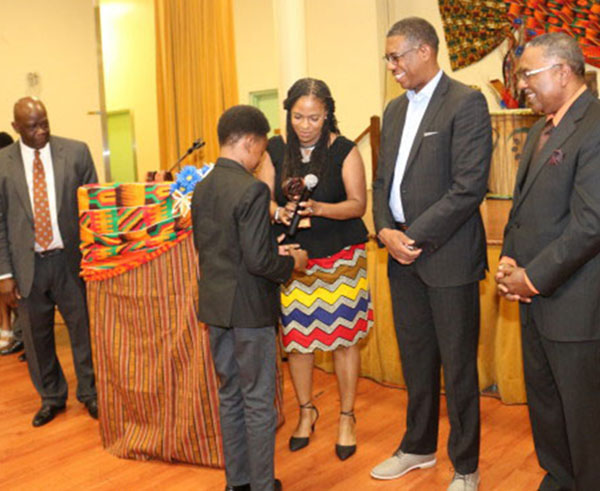
Principal, Luther Brown, left, and retired Senior Justice, Gregory Regis (right) look on, as graduating student, Frank Abankwah, receives his award. Photo by Kingsley Gilliam.
He then opined that parents and family members have an important role to play in the students’ successful development: “Help your children manage their time so that they can stay healthy. During exam periods, for example, cut them some slack, if they are studying, and help them get enough sleep, so that they will be able to perform well.”
Justice Regis concluded his wise remarks, reverting his attention back to the graduates, and instructing them, “Your time in high school, is when you are expected to start taking charge of your future. This is when you will begin to acquire many of the tools you will need, to take your rightful place in Canada — tools, which will allow you to be flexible, so that you can adapt to a rapidly changing world.
“High school will be different from this school. You will encounter new situations and challenges. When that happens, remember your dreams, and where you want to go in life. Use some of the tools that you already have in your toolbox. Let your teachers, and family members help you. Remember why you are there — you are there to get a good education. Don’t let anyone throw you off track.
“Use that time wisely. Enjoy high school. Prepare yourself well for college or university. Remember, dream big. I urge all of you, to take leadership roles, as you carry on your educational journey. It could be in the student union, the sports teams, the drama club or the computer lab. It does not matter where, just do it.
“But remember, you must prepare yourself for the role. The best preparation is to get the best education available. A strong education, will give you the tools you need, to develop the characteristics of an authentic leader.
“You are lucky that you live in Canada, a country with some of the best educational institutions in the world. Take advantage of that. Have a great summer, and enjoy high school.”
The Africentric Alternative School, which serves students, from Junior Kindergarten to Grade 8 — “is a small school”, according to principal Brown — that had a graduating class of eight students this year, with one of them, who joined, in June, for a month.
Of the seven who were in the school for the full year, four will be attending the International Baccalaureate (IB) program at Weston Collegiate Institute, while the other three will attend their preferred high school, at either CW Jeffereys Collegiate Institute or Northview Heights Secondary School.
The school accepts students from across the Greater Toronto Area (GTA) and students are transported to school by their parents, or through arrangements, made by their parents.
“Contrary to some beliefs, our school does not have extra support or facility to appropriately serve students, who display high levels of negative behaviours,” said Brown.
“Our school is focused on helping students to develop their leadership skills, achieve at high academic and well-being levels. We depend on our parents to be supportive of the school.”
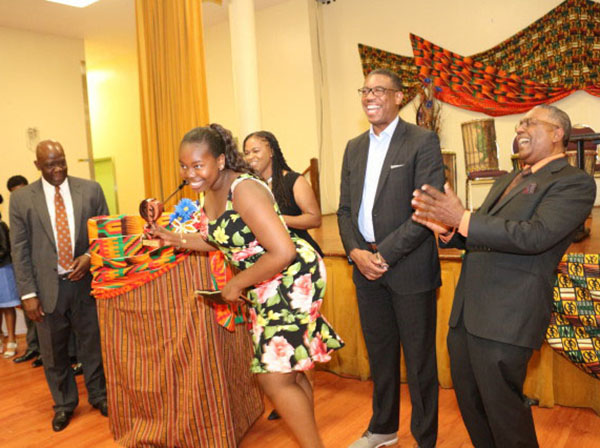
After receiving her award, graduate, Brianna Asiamah’s, celebrating antics, elicites laughter, from Brown, left, Regis (right) and the presenting officials. Photo by Kingsley Gilliam.
When asked what he thought he was able to accomplish since his installation as principal, Brown answered, “I believe that we have been able to establish a school tone that is helpful to (our) students’ achievement. We have been working with staff to more effectively serve the needs of our students, who, by the way, as a group, are quite smart.
“We are working to align pedagogical practices and curriculum to meet the academic and well-being needs of our students.”
He added, “Another accomplishment is that students are demonstrating improved attention to academic achievement, developing their leadership skills, serving the school community and preparing, more deliberately, to achieve their life goals.
“I believe that public perception of the school is changing, in the direction that is helpful to the school.”
Regarding what he hopes for the school, he says, “My hope is that the school helps us, the Toronto District School Board (TDSB) and other jurisdictions, to better understand and serve Black students. I also hope that we are able to help to better develop curriculum strategies that allow critical thinking, in areas of living, while being Black.”
“I believe it is important that there be a clear understanding of ‘teaching from an Africentric lens’, which is a critical tool for all professionals at our school to be working from,” he concluded.
 Pride News Canada's Leader In African Canadian & Caribbean News, Views & Lifestyle
Pride News Canada's Leader In African Canadian & Caribbean News, Views & Lifestyle

